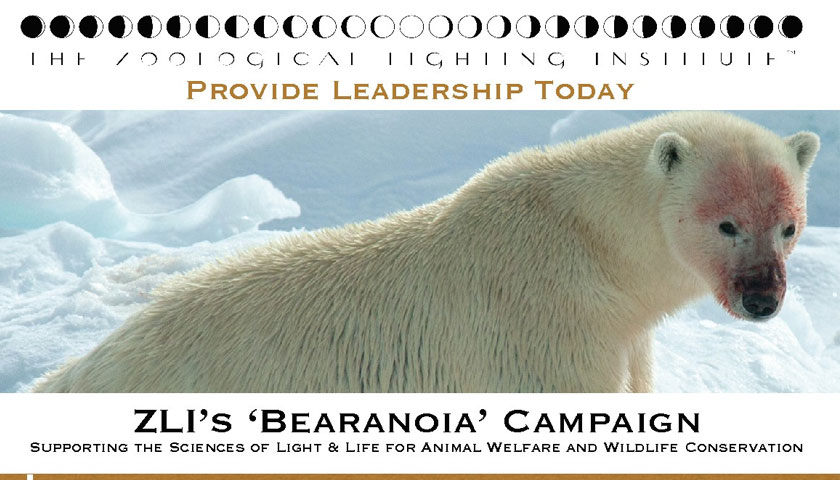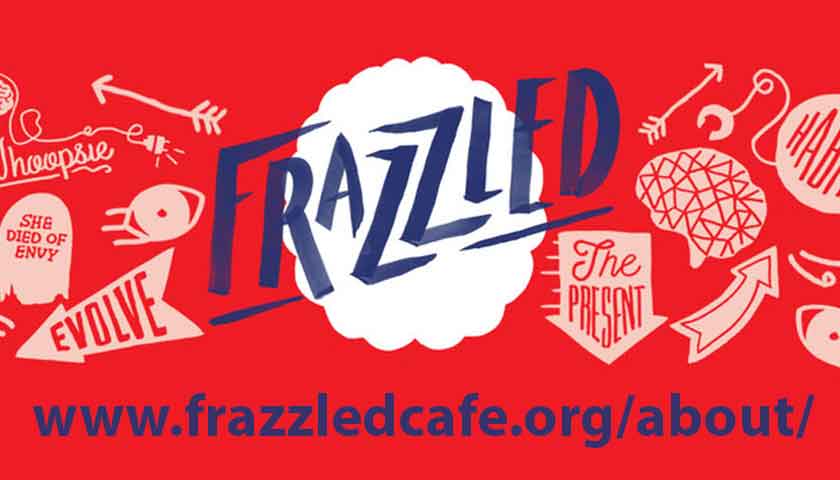The Zoological Lighting Institute™ has launched ZLI’s Bearanoia Campaign, drawing attention to light related mental health challenges. A multi-faceted campaign, ZLI’s Bearanoia Campaign directly supports scientific research into bear photobiology across the ZLI Framework™ (Photo-physiology, Sensory Ecology and Integrative Biology). The initiative has great importance in highlighting mental health challenges related to animals and the environment, as ZLI seeks to improve animal care and wildlife conservation while encouraging attention to a crucial human need. At the heart of ZLI’s Bearanoia Campaign is the relationship between the natural environment and mental health. In order to combat (and mitigate the real costs) of anxiety and denial in the face of wildlife loss and animal suffering, ZLI’s Bearanoia Campaign seeks catharsis through science.
ZLI’s Bearanoia Campaign supports research that connects light and mental health. The World Health Organization (WHO) defines mental health as more than simply an absence of neurological disease. The WHO defines mental health as inclusive of subjective well-being maintained across social, physical and mental conditions. This multi-cultural definition suggests that the physiological damage that artificial light at night (ALAN) causes, is accompanied by additional mental and social harm across a wide variety of international contexts. ZLI’s Bearanoia Campaign turns to bears in this mental health context, as the all too familiar phenomena of repetitive pacing or ‘bear rocking’ has been tied closely to environmental factors.
“According to peer reviewed research published in the journal Applied Animal Behaviour Science1, repetitive pacing is ‘indicative of an animal who is coping with stress by “disengaging from [its] environment” through repetitive, goal-less behavior’. According to the study, limitation of environmental factors significantly contributes to the induction of repetitive pacing. This onset may be temporary or permanent, occurring at any age of a bear’s life. Despite no obvious physical ailments, this mental detachment prevents an affected animal from engaging with other animals and in general, the world around it. While ZLI promotes understanding that artificial light limits environmental conditions in a similar way, there is a broader issue concerning bears themselves. While responsible zoos have attempted desperately over the years to address repetitive pacing through a variety of enrichment schemes and exhibit modifications, a major challenge obviated by this new research relates to wild bears attempting to function in their ecological niches. Mental health is at least as important as physical health, and ZLI’s Bearanoia Campaign seeks to open conversations regarding the mental impacts of habitat loss and degradation in a multi-faceted and layered way, for bears and humans alike.
“Physical and mental health are closely linked, but it is not always obvious how”, noted ZLI Executive Director James Karl Fischer PhD. “ZLI focuses on the importance of environmental light, but really the subject of anxiety and mental illness go way beyond this for people and non-human animals alike. Overwhelming stress, whether due to watching horrendous wildlife declines or seeing individual animals suffer, is unbearable. Denial sets in as a coping mechanism, making problems worse. While ZLI wishes to improve animal care and conserve wildlife in the most effective (i.e. scientific) way for the sake of animals themselves, the main challenge has always been the unfounded human anxieties that prevent the application of scientifically informed solutions. ZLI will provide scholarships and grants to deal with light related challenges, and we also we invite responsible zoos to study stress-related lighting issues by measuring light in their facilities properly. ZLI can help.”
ZLI’s Bearanoia Campaign is set to fund research in the form of grants, scholarships and post-doctorates (when available). It advocates new standards in the managed care of bears, which include proper light measurements over time on a regular basis. ZLI’s Bearanoia Campaign includes bears of all species. ZLI’s Bearanoia Campaign funds photo-physiology, sensory ecology and integrative photo-biology projects. Candidates for the initial grant distribution will be selected on 1 July 2020, with a post-doctorate to be announced formally on 1 September 2020. For more information about ZLI’s Bearanoia Campaign, or to learn how to sponsor or donate to help bears and to alleviate undue human fears over environmental challenges, please do visit <<www.zoolighting.org>>. The Campaign features an upcoming film ‘Bearanoia’, which in conjunction with PhotoDiversity Films will begin shooting in Sitka, Alaska as soon as investments and sponsorships are secured. To find out more, please reach out to The Zoological Lighting Institute at bearanoia@zoolighting.org.

